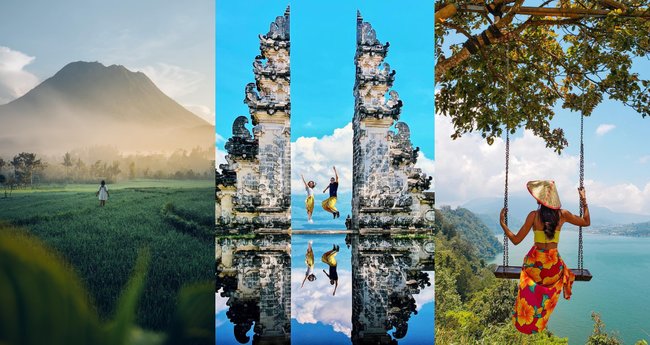Introduction
Bali is often referred to as “The Island of the gods” due to its rich spiritual culture and the prevalence of Hinduism on the island. The name “Island of the gods” reflects the deep spiritual connection and reverence that Balinese people have for their religion and the numerous temples and religious rituals that are an integral part of daily life in Bali.
Hinduism in Bali is a unique blend of traditional Balinese beliefs and practices combined with Hindu influences brought by Indian traders and scholars in ancient times. The Balinese people have embraced and preserved their Hindu traditions, creating a distinct form of Hinduism that is deeply rooted in the island’s culture.
Why it called the islands of gods:
The nickname “Island of the gods” encapsulates the profound spiritual essence that permeates every aspect of life in Bali. From the magnificent temples to the daily rituals and vibrant festivals, Bali’s spiritual culture is a testament to the strong belief and devotion of its people. Visitors to the island are often enchanted by the palpable sense of spirituality and find themselves immersed in a truly unique and sacred experience, thus earning Bali its revered title as “The Island of the gods.”

How People came to Bali Island
The Balinese people are the native inhabitants of the island of Bali, which is located in Indonesia. The origins of the Balinese people can be traced back to a combination of different cultural and ethnic influences over the centuries.
The early history of Bali saw waves of migration and settlement by various ethnic groups from different parts of Southeast Asia. The Austronesian-speaking people, believed to be the ancestors of the Balinese, were among the earliest settlers on the island. They brought with them their language, traditions, and agricultural practices.
The early history of Bali saw waves of migration and settlement by various ethnic groups from different parts of Southeast Asia. The Austronesian-speaking people, believed to be the ancestors of the Balinese, were among the earliest settlers on the island. They brought with them their language, traditions, and agricultural practices.
Around the 8th century, Bali began to experience a significant influx of migrants from Java, the neighboring island. These migrants, who were predominantly of Hindu-Javanese origin, brought with them their culture, religion (Hinduism), and political systems. The Javanese influence played a crucial role in shaping the unique blend of Hinduism and local beliefs that is practiced in Bali to this day.
Bali Island (the island of gods) : culture
Over time, the Balinese people developed their distinct cultural identity, blending the Javanese Hindu influences with their own indigenous beliefs and customs. The caste system, which is an integral part of Balinese society, was also established during this period, drawing inspiration from the Indian varna system.
Throughout history, Bali has also had interactions and influences from other cultures. Chinese traders, Arab merchants, and European colonizers all left their marks on the island, contributing to the cultural diversity of the Balinese people.
Bali Island (the island of gods) : religion
Religion and spirituality play a significant role in the lives of the Balinese people. Hinduism, with its unique Balinese interpretation, is the predominant religion. Balinese Hinduism incorporates elements of ancestor worship, animism, and local beliefs, creating a distinct form of Hinduism that is deeply intertwined with daily life.
Island of gods: Arts & Tradition
The arts and traditional practices are also important aspects of Balinese culture. Music, dance, painting, and sculpture are highly valued and are often used as expressions of religious devotion and cultural identity. Balinese traditional arts have gained international recognition for their beauty and intricacy.
Living in this Era : Island of gods People
The Balinese people have managed to preserve their cultural heritage and traditions despite outside influences and modernization. They have a strong sense of community and maintain close-knit relationships within their villages. Balinese society is organized around the banjar, which is a neighborhood or community unit that collaborates on various social, cultural, and religious activities.
Today, the Balinese people continue to celebrate their unique cultural identity and practices. They welcome visitors from around the world, offering a glimpse into their rich traditions and warm hospitality.
Overall, the Balinese people have evolved through a combination of early Austronesian settlers, Hindu-Javanese migrants, and influences from other cultures. Their rich cultural heritage, vibrant traditions, and deep spirituality make them a fascinating and enduring community on the island of Bali.
Bali Island : Festivals
The Balinese people also celebrate a multitude of religious festivals and ceremonies throughout the year. These events are vibrant and colorful, with processions, traditional music and dance performances, and intricate rituals. The most significant festival in Bali is the Galungan and Kuningan celebration, which commemorates the victory of good over evil. During this time, the island is adorned with elaborate decorations, and families come together to pray, feast, and strengthen their bonds.
